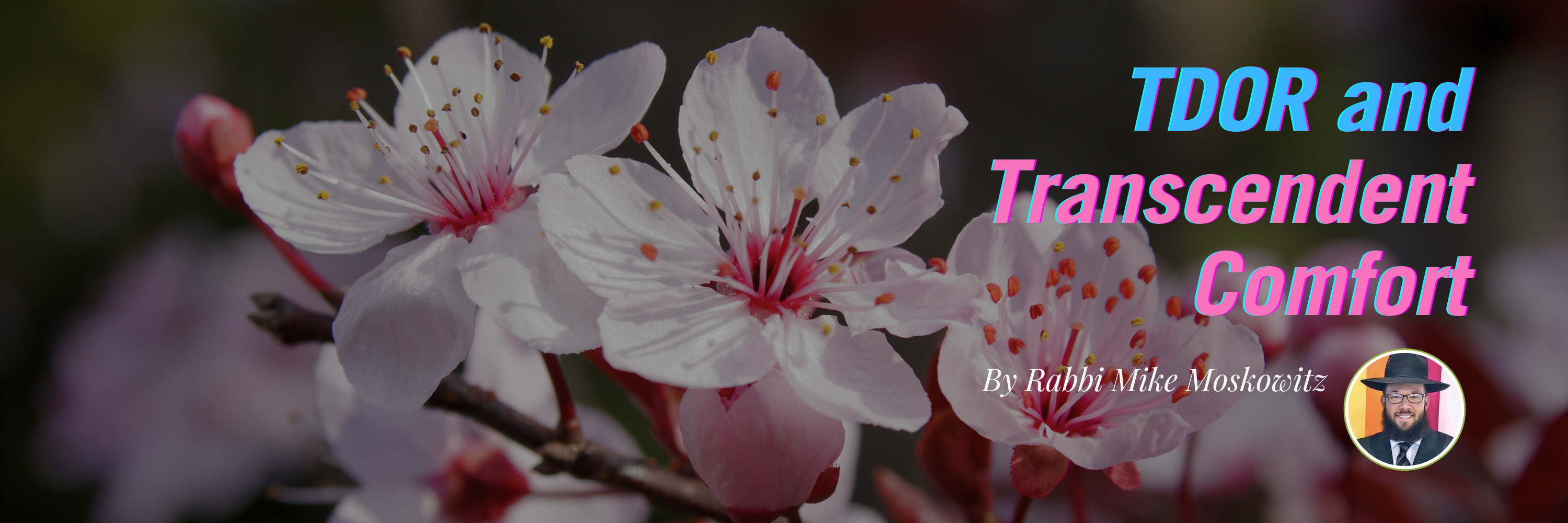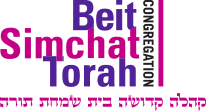
TDOR and Transcendant Comfort
Transgender Day of Remembrance is an annual observance, on November 20, that honors the memory of transgender people whose lives were lost in acts of anti-transgender violence. This year, in the broader context of so much tragic suffering, we acknowledge the role of hatred in propagating evil.
The traditional offering of consolation to a mourner is: “HaMakom Yenachem Etchem B’toch Kol Avelia Tzion V’Yerushalayim – May the Omnipresent comfort you among all of the mourners of Zion and Jerusalem.” Perhaps “HaMakom,” literally “The Place,” is the most appropriate Divine name to use here because it emphasizes that the soul has been relocated and is now delighting in the sublime pleasure of the Divine. Using “HaMakom” acknowledges the shift from a person’s temporary, vulnerable, and earthly embodied being, to the soul’s supernal and permanent existence.
Beyond the comfort of being reminded that God is everywhere, all of the time, highlighting God as the Omnipresent also invites us to find solace in the broader community. Being held by — and with — all those who witness the communal limitations of our own finite capacity to offer consolation, reinforces our reliance on God to be the One who can infinitely comfort. Just as the life of the person we mourn transcends this mortal plane, so too the comfort we seek must also come from beyond this world.
Our natural habitat, and the place we most belong, is one of spirituality. It is also a unique space to find nourishment, protection, and of course comfort. The rabbis say that the locations we turn to for sanctuary in threatening situations are the ultimate indicator of our essential identity.
Acknowledging that the physical world is a reflection of the spiritual, the Mishnah[1] looks to the animal kingdom to teach this lesson: “Every creature that lives in the water is tahor,[2] except for the walrus because it seeks safety on dry land – כֹּל שֶׁבַּיָּם טָהוֹר, חוּץ מִכֶּלֶב הַמַּיִם, מִפְּנֵי שֶׁהוּא בוֹרֵחַ לַיַּבָּשָׁה.” Reb Tzadok HaCohen of Lublin[3] explains that, like the walrus, where we find refuge when we are scared, reveals the roots of who we truly are.
In mourning, the Torah expects us to grieve in ways that help us process and honor the void left by those whom we have lost. We are even warned against mourning excessively:[4] בָּנִ֣ים אַתֶּ֔ם” לַ’ה אֱלֹקיכֶ֑ם לֹ֣א תִתְגֹּֽדְד֗וּ וְלֹֽא־תָשִׂ֧ימוּ קׇרְחָ֛ה בֵּ֥ין עֵינֵיכֶ֖ם לָמֵֽת׃ – You are children to Hashem, your God – you shall not cut yourself…for someone who has died.”
Describing us as God’s “children,” in the context of our sadness, provides a reassuring perspective that just as God is eternal, so too is the soul of the one we are mourning. While the pain and anguish of being separated from a loved one is so very real, in Jewish tradition, it is only temporary and therefore grief must also have its limits.
As mourners on Transgender Day of Remembrance we focus our intentions on harnessing the power of a unified front against hate. Because God is “One,” and we are created in God’s image as God’s children, we are also meant to become one with each other. The Rabbis[5] therefore extend the prohibition of “making cuts” to include divisions in our spiritual communities: אֲמַר לֵיהּ רֵישׁ לָקִישׁ לְרַבִּי יוֹחָנָן: אִיקְּרִי כָּאן ״לֹא תִתְגּוֹדְדוּ״ לֹא תֵּעָשׂוּ אֲגוּדּוֹת אֲגוּדּוֹת – Reish Lakish said to Rabbi Yoḥanan “You shall not cut yourselves [titgodedu] – Do not become numerous factions [agudot].” As we mourn, we mourn together.
Transphobia doesn’t just attempt to erase a person’s gender identity, but like all other meritless discriminations, it rejects our connection to God and each other. Seeing people as God’s children not only inspires a spiritual orientation for humanity, it prevents people from treating each other as anything less than God’s family who are entitled to be safe everywhere.
Today we recommit to ending hatred by loving each other the way that we would want to be loved by God. Comfort will only come when we experience the suffering “B’toch Kol Avelia Tzion V’Yerushalayim – from within the collective mourners of Zion and Jerusalem.”
[1] Kelim 17:13
[2] Often translated as “pure.”
[3] Ohr Zarua LaTzadik 2nd principles of conduct.
[4] Deuteronomy 14:1.
[5] Talmud Yevamot 13b.
